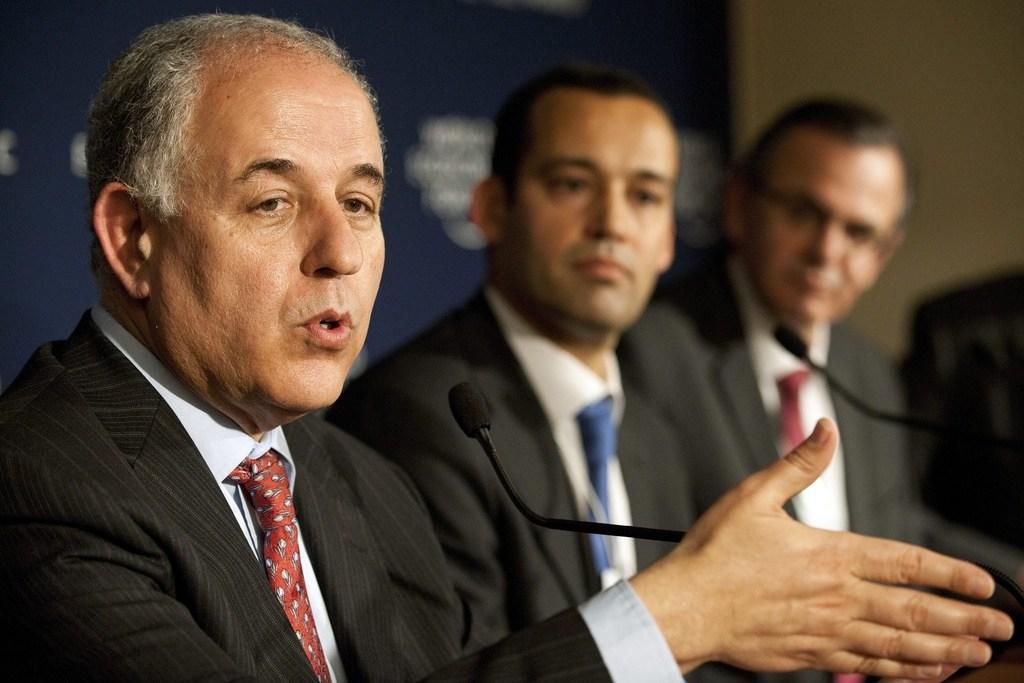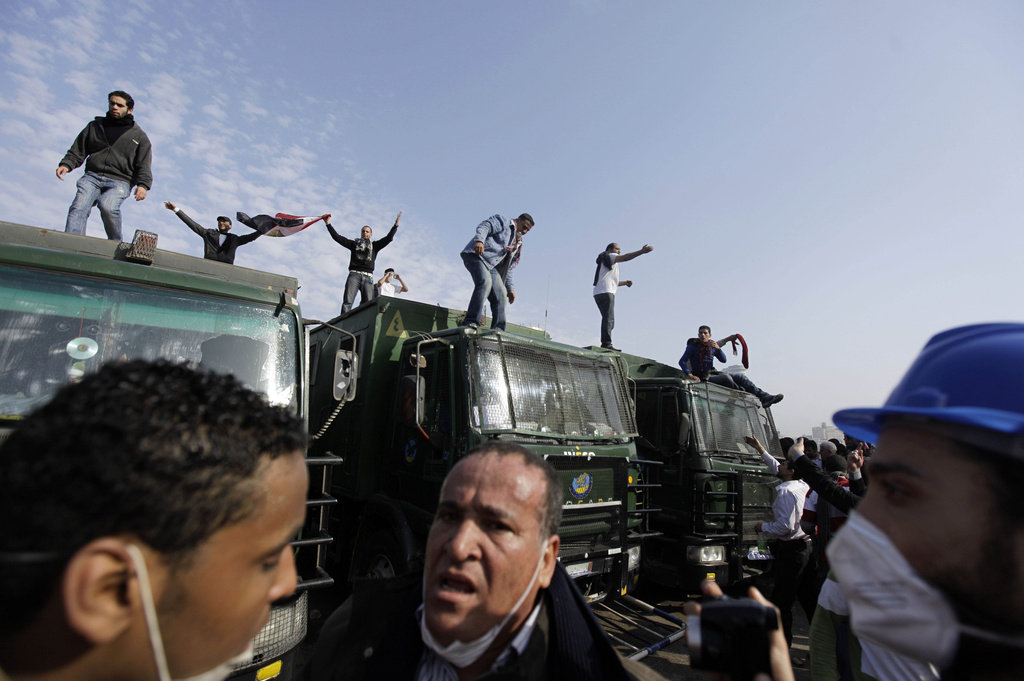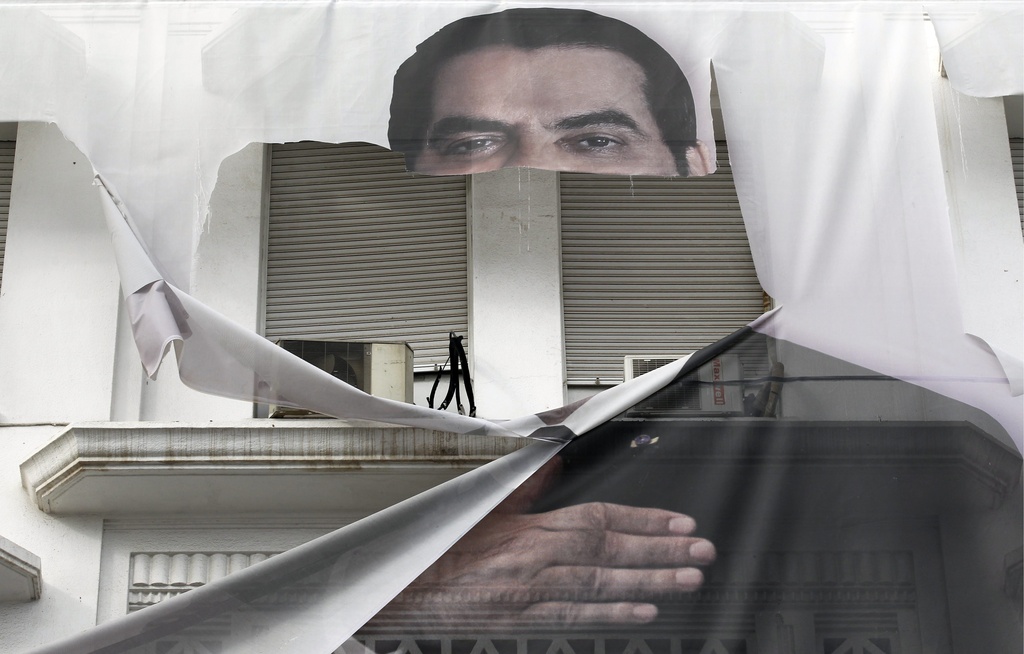New Tunisian ministers unveiled at WEF

Two newly appointed members of the new Tunisian regime presented their first public statements at the World Economic Forum in Davos on Saturday.
Yassine Brahim, minister of infrastructure and transport, and Sami Zaoui, minister of information and communication technology, joined the new governor of Tunisia’s central bank, Mustapha Kamel Nabli, to announce the country is getting back to business as normal.
Brahim and Zaoui, who had both been running businesses in Europe, were appointed in the last 24 hours. Both said they had been given an hour to decide if they would take up their posts, but only took minutes to agree to the offers.
“We are in a transition period during which it is important not to have anyone from the old regime [in the new government]. We need to prove our efficiency and properly assess what we need to do,” Brahim said as he explained why he took up the post.
Nabli opened the address to the assembled media and spoke the most about how Tunisia plans to move forward following the so-called Jasmine Revolution that toppled the old regime of President Zine al-Abidine Ben Ali two weeks ago.
“The situation is stabilising and security is back,” said Nabli. “This means that democracy has taken root. We have come a long way.”
“People had had such depressed feelings for so long that something had to break – which was fear of the regime,” he added. “When it was removed everything happened very quickly.”
Nabri was at pains to point out that the country’s financial system remained intact and that companies were, to the main part, trading as normal with full access to liquidity.
Democracy good for investment
“I would like to convey to investors that that the country has returned to business. Democracy is good for investment. They [foreign counterparts] will be doing business in a much more favourable environment,” Nabli said, adding that corruption would be replaced with transparency.
He urged the international community not to cancel contracts or speculate in a way that could harm Tunisia’s rebuilding economy.
Nabli said no gold reserves had been taken out of the central bank’s reserves by the fleeing regime. An inventory of reserves in Tunisia and London had shown all 6.8 tons of gold to be in place.
Nabli told swissinfo.ch that he was satisfied with the response of the Swiss government to freeze the assets of former president Ben Ali.
“We are pleased that our partner governments, whether they are in the European Union or in Switzerland, have taken precautionary measure to freeze the assets of the individuals,” he said. “But clearly the big work is ahead of us and we have to go through the legal process.”
It is unknown how much money from the former regime lies in the vaults of Swiss or other banks, he added.
Surprise over Egypt
Earlier in the day, experts in Davos had admitted that they had been taken by surprise by the speed and scale of social unrest in Tunisia and now Egypt.
A panel of academic experts, journalists and former politicians, who had assembled at short notice for an unplanned session, were unable to agree on the question of regime toppling unrest spreading in the Middle East.
At the time of the debate, Egyptian president Hosni Mubarak had sacked his government but was still clinging to power despite continued street protests.
Former United Nations deputy secretary-general and British foreign office minister with responsibility for Africa, Mark Malloch-Brown, said the British authorities had initially underestimated the force of events in Egypt when unrest started a few days ago.
They felt Egypt was much more secure than Tunisia because it had a stronger economy, better infrastructure and a more prominent middle class, according to Malloch-Brown. But a strong internet penetration coupled with more students and wealthier people actually proved to be the “Achilles heel” of the regime, he said.
“If Egypt goes then you have to ask if Middle Eastern countries, like Jordan or Syria, are now in play,” he told WEF delegates.
Former Mexican president Ernesto Zedillo said that the situation in Egypt is still far from easy to predict. He warned Western countries not to be too excited if Mubarak’s regime falls because the power gap could be filled by something less palatable.
“Be careful about what you wish for,” he said. “You can say what is happening is profound, but the suggestion that it is easy to flip aside an authoritarian state and install a utopian democracy is dangerous. The biggest nightmare is for Israel to have the most populous Arab country on its doorstep in a state of instability.”
International concern
A host of political leaders, from British Prime Minister David Cameron, German Chancellor Angela Merkel and Japanese Prime Minister Naoto Kan, had called for restraint and dialogue.
United Nations secretary-general Ban Ki-moon called on Egypt to restore communications, especially internet access, to the population.
Amnesty International secretary-general Salil Shetti criticised business leaders in Davos for failing to voice their opinion.
“A lot of people here have vested commercial interests – irons in the fire – in Egypt and they are waiting to see which way it will go,” Shetti told swissinfo.ch. “But the Arab region has a lot of money, so if unrest spreads people will have to get realistic.”
The new law on returning illicit dictator funds deposited in Swiss banks was approved by parliament last year.
It was felt there was a need to enshrine such procedures in law as a result of the often weak legal system in states requesting the return of assets.
In some cases Switzerland was forced to hand the illicit assets back to dictators’ families instead of the state, as was the case in 2009 with funds deposited in Switzerland by former Zairean leader Mobutu Sese Seko.
Under the law the cabinet can block contentious assets and will have up to ten years to launch action to confiscate the assets once they have been blocked.
The confiscation of assets must be declared by the Federal Administrative Court. Any decision to block funds can also be appealed through the court.
Once returned, the funds must be used to improve quality of life for the wider population, strengthen the judicial system and fight against crime.

In compliance with the JTI standards
More: SWI swissinfo.ch certified by the Journalism Trust Initiative












You can find an overview of ongoing debates with our journalists here . Please join us!
If you want to start a conversation about a topic raised in this article or want to report factual errors, email us at english@swissinfo.ch.